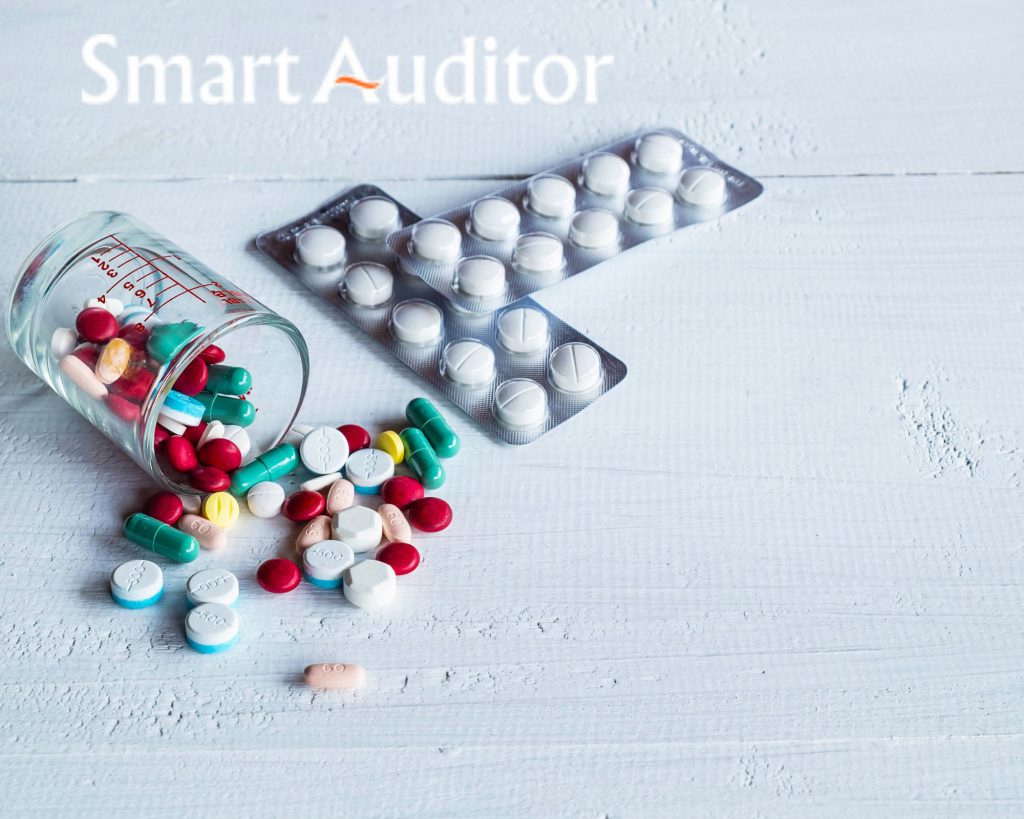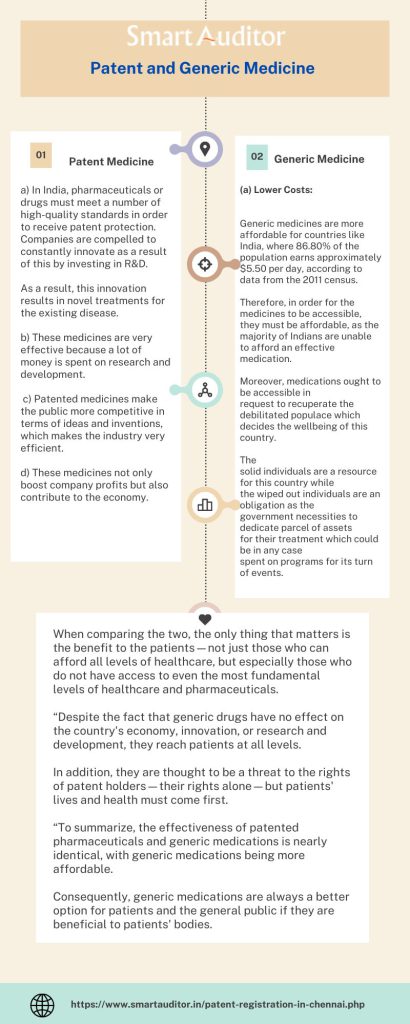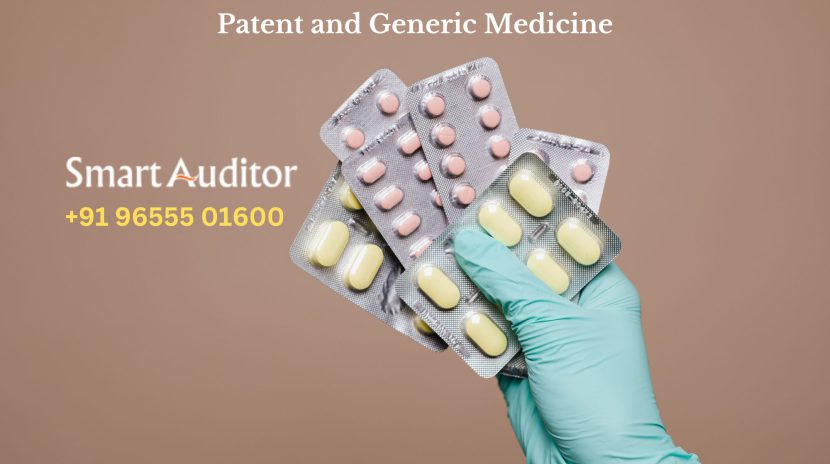Generic Medicine
Generic medicine contain the same active ingredients as medications that are not generic. A non-conventional medication when initially created, applies for a patent which terminates after a specific timeframe and the starting organization has an opportunity to recover its examination speculation.
After a non-generic medicine’s patent expires, it can be produced as a generic after receiving approval and adhering to quality and safety guidelines. These might come from the same company or from another company.
The expenses associated with research and approval procedures determine the price of a drug. As a result, the initial cost of every new drug is very high. Patent registration in Chennai is necessary as the patent system safeguards their resource investments.
The same drug can be copied by anyone after the patent expires after having patent registration in Chennai, and prices drop dramatically. Generic drugs are those kinds of medicines. In every way, generic medicines are the same as brand or reference-listed medicines. India has 35% offer in Generic Market.
Process patent vs. Product patent
Our nation’s patent law is based on the premise that a patent that has patent registration in Chennai can only be issued for a novel and useful invention. There are a few sorts of licenses like Product, Process, Utility, etc. The process patent and the product patent are important, particularly for the pharmaceutical industry. When we talk about a patent registration in Chennai for a product, we mean that someone has come up with a new product.
When we talk about a process patent, it means that someone has come up with a new and better way to make a known product. A process patent which can have patent registration in Chennai only allows claims to be filed for the process, not the product. This is due to the fact that the product created by the aforementioned process is already known, so it lacks novelty. The generic drug industry in India flourished in this manner.
Because of this protection, Indian pharmaceutical companies were able to use their reverse engineering skills to copy expensive drugs made by multinational corporations and produce generics at lower prices. The bio-pharma subsector has also received assistance from the government in the form of grants for expansion and tax breaks for new and established businesses.
Patent registration in Chennai is important as a “process patenting regime” was based on the fact that the prices of drugs, chemicals, and fertilizers in India (and other colonial nations) have always been very high. The “cycle licenses” prompted low medication costs as well as broadened future and finished the customary starvations.
However, being a member of the WTO required that the Indian Patent Act comply with TRIPS. Under this Act, patent registration in Chennai is done. India and every other nation had to change their domestic laws as a result of this. The law was changed in our nation in 1999, 2002, 2005, and 2006. The most talked-about change occurred in 2005, when food, drugs, chemicals, and microorganisms were included in the scope of product patents that has patent registration in Chennai. The final deadline for fully complying with TRIPS was in 2005. Additionally, the Patent Act’s regulations were modified in 2012, 2013, and 2014.
Amendment of Patent Act 2005
The 2005 modification ensured:
- India now grants product patents acquired through patent registration in Chennai and processes payments for products in the chemical, food, and pharmaceutical industries.
- Instead of the earlier five years, the product patent that has patent registration in Chennai will be protected for 20 years.
- India also included a provision in this act that made it possible to issue a compulsory license for the export of medicines to nations with limited or no manufacturing capacity.
- This amendment was made with the intention of making the Indian pharmaceutical and drug industries competitive with multinational corporations.
- Indian generic drug manufacturers have flourished over the past decade, despite initial reservations. MNCs have also established R&D Centers in India. During the time the amendment was passed, it was thought that the new patent regime would cause product prices to go up, which would be a big problem.
- However, the government has used compulsory licensing as a tool to control exorbitant prices and taken proactive measures to guarantee low prices for essential drugs.
- As per the modifications, patent registration in Chennai is done.
Patent medicine

Over the past three decades, the Indian pharmaceutical industry has grown consistently and is a successful high-technology sector. However, the liberalization of the Indian economy is revolutionizing Indian industries as they begin to emerge from domestic markets and prepare for international competition.
The current industry players consist of several privately owned Indian companies that have captured a substantial share of the domestic pharmaceutical market.1
As India opens its markets to international trade, the pharmaceutical industry in India is a prime example of one that is being forced to reevaluate its long-term strategies and business models.
The need to safeguard valuable investments in research and development (R&D) is becoming increasingly recognized, which is why issues like intellectual property protection are taking on an increasing amount of significance.
The Indian government is moving toward establishing a patent regime that can have patent registration in Chennai that is conducive to technological advancement and is in accordance with its global commitments. In addition, efforts are being made in India to reduce issues with the weak enforceability of existing intellectual property laws.
India and generic medicine export
One of India’s greatest assets is the product of conventional meds to nations searching for reasonable drugs.
India is a major contributor to the goal of lowering healthcare costs in numerous nations, including Latin America. In order to make generic medicines more readily available, they encourage Indian pharmaceutical companies to establish operations in their nations.
In Brazil, Mexico, and Argentina, a few Indian pharmaceutical companies have established manufacturing facilities. The success and favorable perception of Indian pharmaceuticals significantly contributed to improving India’s overall image.
India is the world’s largest exporter of generic medicines, contributing significantly to global exports. These medications have a minimal expense of creation, examination and testing.
India plays a crucial role in lowering healthcare costs in developed nations like the United States and the United Kingdom.
Indian generic medicines are also purchased by Western NGOs and foundations.
Jan Aushadhi Scheme (JAS)
The Jan Aushadhi Plan (JAS) started by the Public authority of India is a strong mediation against the baseless valuing of drugs by confidential drug industry, to make the conventional medications accessible at reasonable costs.
Many brand-name medications are unavailable to India’s underprivileged populations; therefore, in the best interest of populations, it is urgently necessary to make the less expensive generics available to Indians.
A poor supply chain, a lack of support for the JAS, a lack of awareness among the general public, the distribution of free medications by state governments, and doctors’ refusal to prescribe generic medications have all been identified as the primary obstacles that the JAS must overcome in order to achieve success.
Conclusion

The most important thing in the health care industry is that patients get the right medications and/or treatment. Therefore, choosing between pharmaceuticals got patent by patent registration in Chennai and generics is crucial for the benefit of patients.
The majority of medical professionals favor patented pharmaceuticals because they are well-known and have been approved by multiple agencies, making them very effective in their eyes. This trust in patented medicines that has patent registration in Chennai is why they are preferred.
However, the government has supported the numerous demonstrations that generic medications are just as effective as proprietary medications. In light of this, “the government would never promote a non-effective medical system because it would put the lives of the entire nation in jeopardy, which is a risk that no authority would want to take,” Both sets of meds have their own arrangement of benefits and inconveniences, making them both helpless and a solid decision for patients. Although none of the drawbacks pose a threat to a patient’s life, the high prices, which prevent patients from purchasing it, and brand fraud may both have an impact on patients’ lives.
When comparing the two, the only thing that matters is the benefit to the patients—not just those who can afford all levels of healthcare, but especially those who do not have access to even the most fundamental levels of healthcare and pharmaceuticals.
“Despite the fact that generic drugs have no effect on the country’s economy, innovation, or research and development, they reach patients at all levels.
In addition, they are thought to be a threat to the rights of patent holders through patent registration in Chennai —their rights alone—but patients’ lives and health must come first.
“To summarize, the effectiveness of pharmaceuticals that has patent registration in Chennai and generic medications is nearly identical, with generic medications being more affordable.
Consequently, generic medications are always a better option for patients and the general public if they are beneficial to the patients’ bodies.
About Us
We Smartauditor serve numerous clients for Patent and other business registrations.

